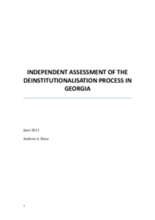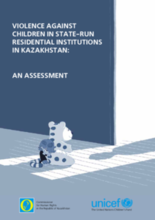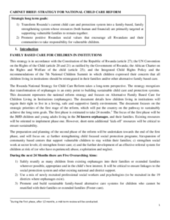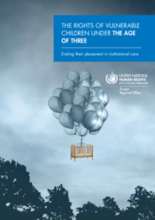Displaying 501 - 510 of 662
Press release from UNICEF and OHCHR launching a joint campaign to put an immediate end to the practice of placing young children into State-run infant homes.
Published by UNICEF, the report At Home or in a Home, provides an overview of the major trends and concerns about children in formal care and institutions as well as adoption Central and Eastern Europe and Central Asia.
This independent assessment examined, specifically, the deinstitutionalisation of children in special education boarding schools and child care institutions in the Republic of Georgia.
This paper summarizes the evidence base on residential care to promote better decision making among policy makers and child welfare practitioners
This study on violence against children in state-run residential institutions in Kazakhstan was conducted under the national Office of the Commissioner for Human Rights and UNICEF. Data was collected from six different types of state run- residential institutions for children in 3 regions using a multi-methods approach, including surveys with children ( 9-18 years old) and staffs, and interviews with young people (17-23 years old) who had left the care of these institutions.
This report analyzes how a small sample of 12 children’s homes in England achieved and sustained outstanding status over a period of three years. The report describes and interprets what inspectors found to be the reasons for success in these outstanding homes and how the providers themselves explained the factors that contribute to outstanding care. The experience of the children and young people who live in these homes is also a key element of the report as it is, of course, the real hallmark of quality.
Particularly relevant to alternative care issues is the highlighted section on the Bulgarian experience of integrating advocacy, fundraising and communication in order to influence the deinstitutionalization of children without parental care in Bulgaria.
This brief was prepared by the Rwandan Ministry of Gender and Family Promotion (MIGEPROF), requesting the Cabinet to approve the proposed child care reform strategy and to support its implementation.
The first ever World report on disability, produced jointly by WHO and the World Bank, suggests that more than a billion people in the world today experience disability. This report provides the best available evidence about what works to overcome barriers to health care, rehabilitation, education, employment, and support services, and to create the environments which will enable people with disabilities to flourish. The report ends with a concrete set of recommended actions for governments and their partners.
This document was commissioned by the Regional Office for Europe of the Office of the United Nations High Commissioner for Human Rights (ROE OHCHR). One of its aims was to stimulate discussion at the Sub-Regional Workshop on the Rights of Vulnerable Children Aged 0 to 3 Years in Prague on 22 November 2011.








